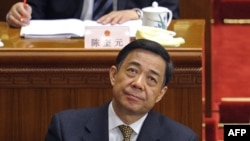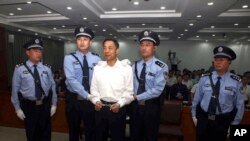BEIJING —
Disgraced Chinese politician Bo Xilai was formally expelled from China’s legislature on Friday, clearing the way for possible criminal and corruption charges to be brought against the former rising political star.
By stripping Bo of his legislative seat, the standing committee of parliament made sure the former Chongqing party chief will no longer enjoy immunity from prosecution. Bo faces a wide range of allegations many of which were outlined late last month when state media reported that he had been purged from the Communist Party.
Bo has been accused of corruption stretching back more than a decade and of interfering in the investigation into the murder of a British businessman, a crime his wife and a family aide were recently found guilty of committing.
It’s unclear though, just how soon Bo could be put on trial. Some believe that the party would like to take care of the case before its 18th National Party Congress, which opens November 8, and marks the beginning of a once-in-a-decade leadership transition for China.
Long process
Li Xiaolin, the lawyer Bo’s family has asked to represent him in court says the entire procedure could take more than a year.
Li says he does not know when the trial could take place and that there is too little time before the 18th party congress to carry out all of the legal procedures involved in the case.
“First, I have no idea when the trial could take place and secondly, from the perspective of the legal procedure, there is too little time before the 18th Party Congress,” says Li.
The lawyer says he still does not know whether the government will let him represent Bo in the case.
When Bo was purged from China’s Communist Party late last month, state-run Xinhua news agency released an extensive report detailing allegations of how he abused his power and bore major responsibility in the murder case. The report also accused him of using his position to seek profits for others and of taking bribes either personally or through family members.
Investigation
Li, however, says that an independent investigation needs to be carried out before Bo should be put on trial.
Li says that before the case can go to trial, there needs to be an investigation and indictment. He says that while judicial authorities will carry out an independent inquiry, they will most likely use the details from the Xinhua report in their investigation.
“There needs to be an investigation and an indictment before the case can go to court," he stresses. "Judicial authorities will carry out their investigation independently, but the details as outlined in the Xinhua report will most likely be clues that they will use in their investigation.”
Fall from grace
2012
2013
Once a rising political star, Bo was widely expected to win a powerful spot in China's party leadership reshuffle that begins early next month. But now, the party appears to be drawing a clear line between itself and Bo.
Earlier this week, the party announced the promotion of five generals to new posts. Analysts note that among those who were passed over for a promotion was General Liu Yuan, a man who is considered to have close ties to Bo.
David Kelly, research director at the Beijing-based group China Policy, says that while too much could be read into the changes, the military is facing concerns about corruption.
“ I think that all these people, all these appointments, I assume will be very, very, clean. They have to select clean people, you know ‘Lian Zheng’ [Chinese for ‘clean-governance’] is the name of the game," Kelly notes. "You'll probably find that these people have spotless records, but how would you know if they didn't? You know.”
In China there is widespread public concern about corruption among the country’s ruling elite.
Corruption
On Friday, the same day that Bo was stripped of his seat, the New York Times released a lengthy investigative story that claimed the family of Chinese Premier Wen Jiabao had accumulated assets worth $2.7 billion.
The assets, the report says were largely amassed over the past decade since he rose to high office in 2002. Wen is one of China’s most popular politicians who earlier this year called corruption the “greatest threat” to the ruling party.
China’s Foreign Ministry said Friday there was no reason to be concerned about such reports and said they are aimed at smearing China’s reputation overseas.
Chinese censors Friday blocked access to the New York Times website and deleted references to the prime minister and his family on social media networks.
Photo Gallery: Bo Xilai Scandal
By stripping Bo of his legislative seat, the standing committee of parliament made sure the former Chongqing party chief will no longer enjoy immunity from prosecution. Bo faces a wide range of allegations many of which were outlined late last month when state media reported that he had been purged from the Communist Party.
Bo Xilai Bio Box
Bo Xilai- Father Bo Yibo was one of the founders of the People's Republic of China
- Bo Xilai joined the Communist Party in 1980
- Was mayor of Dailan, governor of Liaoning province and commerce minister
- Named leader of Chongqing city in 2007 and ascended to membership in the Politburo
- Gained prominence for launching crackdown on corruption in Chongqing
- Expelled form Communist Party in September, 2012
- Found guilty of bribery, corruption and abuse of power in September, 2013, sentenced to life in prison
It’s unclear though, just how soon Bo could be put on trial. Some believe that the party would like to take care of the case before its 18th National Party Congress, which opens November 8, and marks the beginning of a once-in-a-decade leadership transition for China.
Long process
Li Xiaolin, the lawyer Bo’s family has asked to represent him in court says the entire procedure could take more than a year.
Li says he does not know when the trial could take place and that there is too little time before the 18th party congress to carry out all of the legal procedures involved in the case.
“First, I have no idea when the trial could take place and secondly, from the perspective of the legal procedure, there is too little time before the 18th Party Congress,” says Li.
The lawyer says he still does not know whether the government will let him represent Bo in the case.
When Bo was purged from China’s Communist Party late last month, state-run Xinhua news agency released an extensive report detailing allegations of how he abused his power and bore major responsibility in the murder case. The report also accused him of using his position to seek profits for others and of taking bribes either personally or through family members.
Investigation
Li, however, says that an independent investigation needs to be carried out before Bo should be put on trial.
Li says that before the case can go to trial, there needs to be an investigation and indictment. He says that while judicial authorities will carry out an independent inquiry, they will most likely use the details from the Xinhua report in their investigation.
“There needs to be an investigation and an indictment before the case can go to court," he stresses. "Judicial authorities will carry out their investigation independently, but the details as outlined in the Xinhua report will most likely be clues that they will use in their investigation.”
Fall from grace
Timeline of the Bo Xilai Scandal
Timeline of the Bo Xilai Scandal2012
- February 2: Bo's key ally and Chongqing police chief Wang Lijun is demoted
- February 6: Wang visits U.S. consulate in Chengdu
- March 15: Bo dismissed as Chongqing party chief
- March 26: Britain asks China to investigate November death of Briton Neil Heywood in Chongqing
- April 10: Bo suspended from Communist Party posts. China says Gu is being investigated for Heywood's death
- August 20: Gu given suspended death sentence after confessing to Heywood's murder
- September 24: Wang convicted of defection, power abuse and bribe taking
- September 28: Communist Party expels Bo
2013
- July 25: Bo indicted for bribery, corruption, abuse of power
- August 22: Bo trial begins in Jinan
- September 22: Bo sentenced to life in prison
Earlier this week, the party announced the promotion of five generals to new posts. Analysts note that among those who were passed over for a promotion was General Liu Yuan, a man who is considered to have close ties to Bo.
David Kelly, research director at the Beijing-based group China Policy, says that while too much could be read into the changes, the military is facing concerns about corruption.
“ I think that all these people, all these appointments, I assume will be very, very, clean. They have to select clean people, you know ‘Lian Zheng’ [Chinese for ‘clean-governance’] is the name of the game," Kelly notes. "You'll probably find that these people have spotless records, but how would you know if they didn't? You know.”
In China there is widespread public concern about corruption among the country’s ruling elite.
Corruption
On Friday, the same day that Bo was stripped of his seat, the New York Times released a lengthy investigative story that claimed the family of Chinese Premier Wen Jiabao had accumulated assets worth $2.7 billion.
The assets, the report says were largely amassed over the past decade since he rose to high office in 2002. Wen is one of China’s most popular politicians who earlier this year called corruption the “greatest threat” to the ruling party.
China’s Foreign Ministry said Friday there was no reason to be concerned about such reports and said they are aimed at smearing China’s reputation overseas.
Chinese censors Friday blocked access to the New York Times website and deleted references to the prime minister and his family on social media networks.
Photo Gallery: Bo Xilai Scandal





